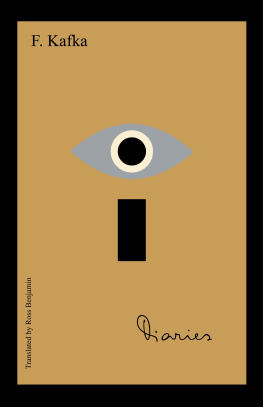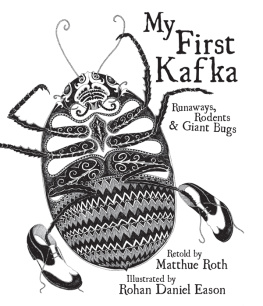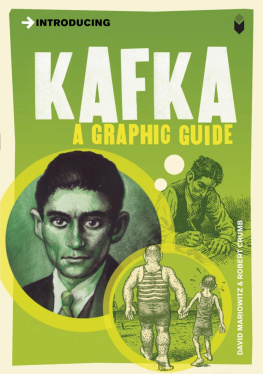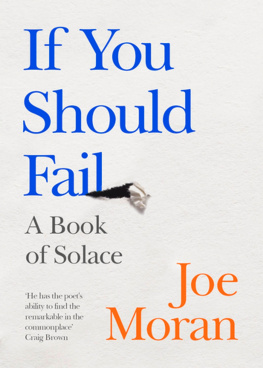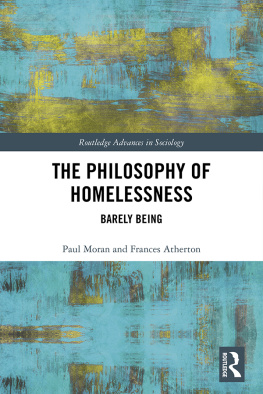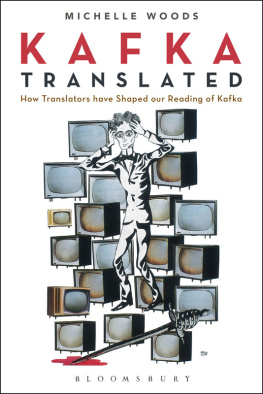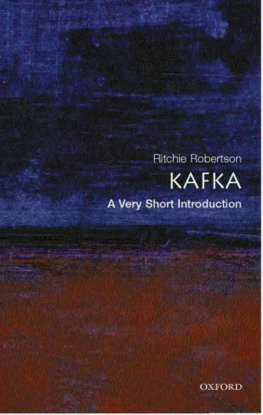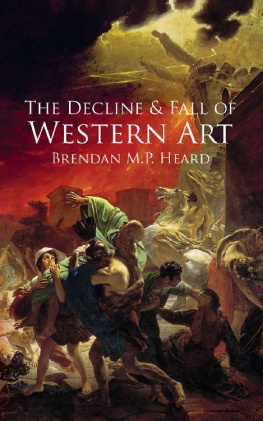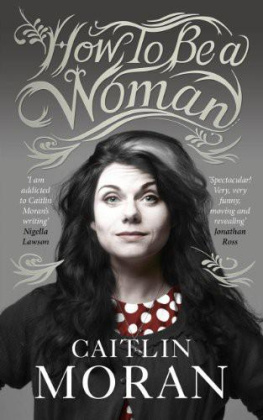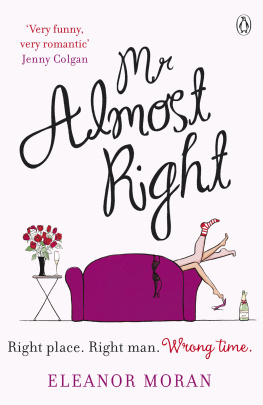Moran Brendan - Philosophy and Kafka
Here you can read online Moran Brendan - Philosophy and Kafka full text of the book (entire story) in english for free. Download pdf and epub, get meaning, cover and reviews about this ebook. City: Lanham, year: 2013, publisher: Lexington Books, genre: Romance novel. Description of the work, (preface) as well as reviews are available. Best literature library LitArk.com created for fans of good reading and offers a wide selection of genres:
Romance novel
Science fiction
Adventure
Detective
Science
History
Home and family
Prose
Art
Politics
Computer
Non-fiction
Religion
Business
Children
Humor
Choose a favorite category and find really read worthwhile books. Enjoy immersion in the world of imagination, feel the emotions of the characters or learn something new for yourself, make an fascinating discovery.

- Book:Philosophy and Kafka
- Author:
- Publisher:Lexington Books
- Genre:
- Year:2013
- City:Lanham
- Rating:3 / 5
- Favourites:Add to favourites
- Your mark:
- 60
- 1
- 2
- 3
- 4
- 5
Philosophy and Kafka: summary, description and annotation
We offer to read an annotation, description, summary or preface (depends on what the author of the book "Philosophy and Kafka" wrote himself). If you haven't found the necessary information about the book — write in the comments, we will try to find it.
Philosophy and Kafka — read online for free the complete book (whole text) full work
Below is the text of the book, divided by pages. System saving the place of the last page read, allows you to conveniently read the book "Philosophy and Kafka" online for free, without having to search again every time where you left off. Put a bookmark, and you can go to the page where you finished reading at any time.
Font size:
Interval:
Bookmark:
Paul Alberts teaches in the areas of ethics, communications and history of political thought in the School of Humanities and Languages at the University of Western Sydney, Australia. He is currently researching and writing on philosophical responses to climate change and environmental issues, in particular how Continental philosophy can contribute to better understanding of the emerging climate change challenges.
Ronald Bogue is distinguished research professor and Josiah Meigs Distinguished Teaching Professor in the department of comparative literature at the University of Georgia, USA. His books include Deleuze and Guattari (Routledge, 1989), Deleuze on Literature (London: Routledge, 2003), Deleuze on Cinema (Routledge, 2003), Deleuze on Music, Painting, and the Arts (Routledge, 2003), and Deleuzes Wake (SUNY Press, 2004).
Chris Danta teaches English literature in the School of English, Media and Performing Arts at the University of New South Wales, Australia. His book Literature Suspends Death: Sacrifice and Storytelling in Kierkegaard, Kafka and Blanchot has recently appeared (Continuum, 2011); he has co-edited The Political Animal , Special Issue of SubStance 37.3 (2008).
Paul Haacke received his PhD in comparative literature from the University of California, Berkeley, and is currently teaching in the media, culture and communication department at New York University. His work has appeared or is forthcoming in diacritics , French Forum , The Review of Contemporary Literature , American Book Review , and In These Times , among other publications.
Brendan Moran is currently research scholar at the Calgary Institute for the Humanities, and adjunct associate professor at the University of Calgary, Canada, where he has taught in the department of philosophy, the Faculty of Humanities, and the Faculty of Arts. Under the anagrammatic pseudonym Monad Rrenban, he has published Wild, Unforgettable Philosophy , a book on Walter Benjamins early writings. He has also published essays on Benjamin, Agamben, and Salomo Friedlaender, and is completing a book on Benjamins Kafkan politics.
Rainer Ngele teaches in the department of German studies at Yale University, USA. He has taught and written on German literature from the Baroque to the twentieth century and has written as well on French and classical Greek literature. His many books include: Heinrich Bll: Einfhrung in das Werk und die Forschung ; Peter Handke ; Literatur und Utopie: Versuche zu Hlderlin ; Text, Geschichte und Subjektivitt in Hlderlins Dichtung: Unebarer Schrift gleich ; Reading after Freud. Essays on Goethe, Hlderlin, Habermas, Nietzsche, Brecht, Celan, and Freud ; Theater, Theory, Speculation: Walter Benjamin and the Scenes of Modernity ; Echoes of Translation: Reading Between Texts ; Lesarten der Moderne: Essays ; Literarische Vexierbilder: Drei Versuche zu einer Figur ; Echos: bersetzen. Lesen zwischen Texten ; Hlderlins Kritik der poetischen Vernunft .
Brian OConnor teaches in the school of philosophy at the University College Dublin, Ireland. He has published Adornos Negative Dialectic: Philosophy and the Possibility of Critical Rationality (MIT Press, 2004) and Adorno: The Routledge Philosophers (Routledge, 2010), and edited or co-edited The Adorno Reader (Blackwells, 2000), German Idealism: An Anthology and Guide (Edinburgh University Press, 2006), and The Routledge Companion to German Idealism (Routledge, 2010).
Andrew R. Russ taught as a tutor and associate lecturer in European studies at the University of Adelaide, Australia, for five years, teaching the literature, philosophy, visual art, politics and history of modern Europe. He is now teaching casually at the University of Sydney in international and global studies and European studies, and the University of Notre Dame (Sydney) in philosophy. Along with this teaching, Andrew Russ has been active in experimental theatre as a founding member of The Border Project .
Carlo Salzani holds a degree in philosophy from the University of Verona (Italy) and a PhD in comparative literature from Monash University (Australia). He has published Crisi e possibilit: Robert Musil e il tramonto dellOccidente (Peter Lang, 2010), Constellations of Readings: Walter Benjamin in Figures of Actuality (Peter Lang, 2009) and co-edited Essays on Boredom and Modernity (Rodopi, 2009). He has translated into Italian some of Slavoj ieks books.
Peter Schwenger is resident fellow at the Centre for the Study of Theory and Criticism, University of Western Ontario, Canada. His most recent book is The Tears of Things: Melancholy and Physical Objects (University of Minnesota Press, 2006). Forthcoming is his At the Borders of Sleep: On Liminal Literature (University of Minnesota Press, 2012).
Kevin W. Sweeney teaches philosophy at the University of Tampa, USA. His research interests center on philosophical aesthetics, ethics, and the history of modern philosophy. In aesthetics, he has published essays on film theory and Hollywood silent comedy, particularly on the silent films of Buster Keaton. He has also published articles analyzing philosophical themes in literary works, including essays on Kafka, Sartre, and Harold Pinter. A previous article on Kafkas The Metamorphosis was selected for inclusion in the Norton Critical Edition of The Metamorphosis (1996) and republished in Harold Blooms Franz Kafkas The Metamorphosis , New Edition (2008).
Dimitris Vardoulakis teaches in the department of writing and society at the University of Western Sydney, Australia. He has published The Doppelgnger: Literatures Philosophy (Fordham University Press, 2010) and co-edited the collections After Blanchot: Literature, Criticism, Philosophy (University of Delaware Press, 2005), Spinoza Now (University of Minnesota Press, 2010), Sparks will Fly: Martin Heidegger and Walter Benjamin (SUNY, forthcoming) and Freedom and Confinement in Modernity: Kafka's Cages (Palgrave Macmillan, 2011). He is currently writing a book on sovereignty and another book on prison writings.
Isak Winkel Holm is associate professor in the department for arts and cultural studies at the University of Copenhagen. His research field is the interregnum between philosophy and literature: Rousseau, Schlegel, Hegel, Nietzsche, Dostoevsky, Musil, Kafka, Kundera, DeLillo, Sebald, McCarthy. He is presently working on a monograph on Kafka ( Kafkas Justice. An Introduction , Gyldendal 2012). He has translated the first complete Danish edition of Kafkas stories in two volumes (Franz Kafka, Fortllinger and Efterladte fortllinger , Gyldendal 2008).
Karen Zumhagen-Yekpl is Harvard College Fellow in Comparative Literature at Harvard. Previously, she was a postdoctoral fellow in the Andrew W. Mellon Fellowship of Scholars in the humanities and in the English department at Stanford. She has written articles on Joyce, Kafka, Woolf, Wittgenstein and Piglia. Her current book project, A Different Order of Difficulty: Question, Quest and Transformative Yearning in Modernism , examines the ethics of enigma and the unorthodox modern narratives of quest and conversion that resonate in the high-modernist puzzle text. Her next project deals with the legacy of modernisms absorption in riddles and transformative longing in the work of J. M. Coetzee.
The Inversion of Socratic Ignorance in the Knowledge of the Dogs
Rainer Ngele
Knowledge we have. Whoever strives for it with special effort is under suspicion of striving against it.
Franz Kafka1
We, if such a collective pronoun is permitted in order to point to a certain characteristic of Western thought, are more or less touched by the Socratic knowledge that we know that we do not know. It has been proposed to us as an ideal. It is the essential Socratic virtue: the virtue of not knowing as the precondition of all knowledge, the reduction of all certainties of knowledge as the condition for possible provisional certainties.
Font size:
Interval:
Bookmark:
Similar books «Philosophy and Kafka»
Look at similar books to Philosophy and Kafka. We have selected literature similar in name and meaning in the hope of providing readers with more options to find new, interesting, not yet read works.
Discussion, reviews of the book Philosophy and Kafka and just readers' own opinions. Leave your comments, write what you think about the work, its meaning or the main characters. Specify what exactly you liked and what you didn't like, and why you think so.

